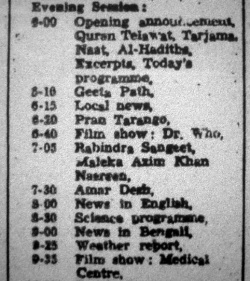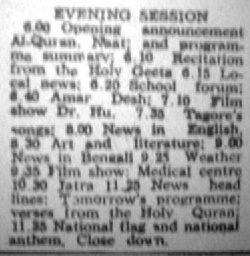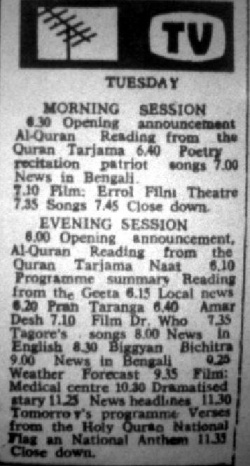Difference between revisions of "Bangladesh"
Jon Preddle (talk | contribs) |
Jon Preddle (talk | contribs) |
||
| (11 intermediate revisions by the same user not shown) | |||
| Line 1: | Line 1: | ||
| − | '''[[Wikipedia:Bangladesh|BANGLADESH]]''' is located to the east of India. | + | '''[[Wikipedia:Bangladesh|BANGLADESH]]''' is located to the east of [[India]]. |
{{TOC right}} | {{TOC right}} | ||
==Profile== | ==Profile== | ||
| Line 20: | Line 20: | ||
|} | |} | ||
| + | ==Television Stations / Channels== | ||
| − | + | Bangladesh began its television service in 1964 when it was still part of East Pakistan. | |
| − | Bangladesh | + | '''[[wikipedia:Bangladesh Television| Bangladesh Television]]''' is a government-owned service, operating two channels: '''6 and 9'''. Although it had colour service from 1980, the majority of television sets were still black and white. Accordingly, much of the broadcast material was also in black and white. (This is explored further below.) |
| − | + | ==Languages== | |
The official language of Bangladesh is Bangla, with English as a recognised secondary language. However most TV broadcasts were in English. Only late evening News bulletins and Al-Quran readings were broadcasts in Bengali. | The official language of Bangladesh is Bangla, with English as a recognised secondary language. However most TV broadcasts were in English. Only late evening News bulletins and Al-Quran readings were broadcasts in Bengali. | ||
| Line 33: | Line 34: | ||
Bangladesh picked up the series towards the end of the SECOND WAVE of sales (see [[Selling Doctor Who]]). | Bangladesh picked up the series towards the end of the SECOND WAVE of sales (see [[Selling Doctor Who]]). | ||
| − | |||
==[[BBC Records]]== | ==[[BBC Records]]== | ||
| Line 46: | Line 46: | ||
==Stories bought and broadcast== | ==Stories bought and broadcast== | ||
| − | + | ===[[Jon Pertwee stories|JON PERTWEE]]=== | |
| − | |||
| − | ===[[Jon Pertwee stories|JON PERTWEE]] | ||
Five stories, 26 episodes: | Five stories, 26 episodes: | ||
| Line 66: | Line 64: | ||
|} | |} | ||
| − | The | + | The TV listings (see below) indicate that the series was '''Film'''. It's likely that Bangladesh was supplied with old black and white 16mm prints rather than PAL video tapes, particularly when one takes into account that four of these stories no longer existed in that format in 1980. |
| + | |||
| + | ====Origin of the Prints?==== | ||
| + | |||
| + | BBC records indicate that the ABC in [[Australia]] supplied the prints of [[Spearhead from Space]] in September 1979. Since the ABC had sent its b/w prints of Jon Pertwee's first serial to [[New Zealand]] in 1974, it would appear that it was the '''colour''' print used for the ABC's 1978 and 1979 repeats of that serial that were sent to Bangladesh a few months later. | ||
| − | + | It's not known from where the other four serials came; since the ABC didn't air [[Inferno]], and it would have already disposed of the other episodes by 1979/80, [[Australia]] is not likely to be the source. Since [[Saudi Arabia]] was the only previous country to screen them in b/w (in 1977), they are the most likely source. | |
==Transmission== | ==Transmission== | ||
| − | ===[[Jon Pertwee stories|JON PERTWEE]] | + | ===[[Jon Pertwee stories|JON PERTWEE]]=== |
[[File:Bang TV2.JPG|thumb|right|250px|Film Show Dr Who, 6.40pm, 8 July 1980]] | [[File:Bang TV2.JPG|thumb|right|250px|Film Show Dr Who, 6.40pm, 8 July 1980]] | ||
[[File:Bang Hu.JPG|thumb|right|250px|Film show Dr Hu, 7.10pm, 29 July 1980]] | [[File:Bang Hu.JPG|thumb|right|250px|Film show Dr Hu, 7.10pm, 29 July 1980]] | ||
[[File:Bang TV1.JPG|thumb|right|250px|Film Dr Who, 7.10pm]] | [[File:Bang TV1.JPG|thumb|right|250px|Film Dr Who, 7.10pm]] | ||
| − | The first clear listing for ''' | + | The first clear listing for the series appears as '''"Film Show: Dr. Who"''' on Tuesday, '''8 July 1980'''. The programme that appeared in that same time slot for the five weeks previous - 3 June to 1 July - was simply billed as '''"Film Show"''', so some of these may or may not have been '''Doctor Who'''. (But see below.) |
| − | The timeslots did change, with 6.40pm being the earliest, and 7.10pm the latest. | + | The timeslots did change, with 6.40pm being the earliest, and 7.10pm the latest. There is no certainty that the serials aired in the correct story order. |
From '''1 October''', for the final 13 episodes, the series shifted to Wednesdays, at 6.15pm for all listings. The programme was pre-empted on 17 December, to allow for coverage of special Victory Day celebrations and other religious programming. (Bangladesh celebrates its independence from Pakistan annually on 16 December.) | From '''1 October''', for the final 13 episodes, the series shifted to Wednesdays, at 6.15pm for all listings. The programme was pre-empted on 17 December, to allow for coverage of special Victory Day celebrations and other religious programming. (Bangladesh celebrates its independence from Pakistan annually on 16 December.) | ||
| − | The last episode listed ''' | + | The last episode listed for '''"Film Dr Who"''' was on '''31 December 1980'''. From 7 January 1981, the timeslot was taken by the American crime series '''[[wikipedia:The Green Hornet|The Green Hornet]]''', which '''was''' specifically billed as being '''"coloured"'''. |
(Knowing that we have 26 episodes of '''Doctor Who''' to account for, and allowing for the 17 December pre-emption, '''Doctor Who''' would indeed have started on 8 July.) | (Knowing that we have 26 episodes of '''Doctor Who''' to account for, and allowing for the 17 December pre-emption, '''Doctor Who''' would indeed have started on 8 July.) | ||
| − | + | There is no record that Bangladesh screened '''Doctor Who''' again. | |
| − | + | ====Fate of the Prints?==== | |
| + | Bangladesh was the last TV station to air Pertwees in black and white. The films were destroyed or returned to the BBC. | ||
| Line 97: | Line 100: | ||
TV listings have been obtained from the newspaper ''Bangladesh Observer'' and ''Bangladesh Times''. | TV listings have been obtained from the newspaper ''Bangladesh Observer'' and ''Bangladesh Times''. | ||
| − | The newspapers abbreviated the title to '''"Dr Who"'''. Only a few times was '''"Doctor Who"''' in full used. For all billings the terms '''"Film"''' or '''"Film Show"''' is used. | + | The newspapers abbreviated the title to '''"Dr Who"'''. Only a few times was '''"Doctor Who"''' in full used. For all billings the terms '''"Film"''' or '''"Film Show"''' is used in front of the series title. For a couple of listings, the papers had '''"Dr Hu"'''. |
| − | On '''12 August 1980''', the billings in both newspapers simply say '''"Children's Programme"''' from 6.20 to 7.05pm, followed by '''"Variety Programme"''' from 7.05 to 7.30pm. Given that this would be in the middle of the serial that was playing at the time, it is more than likely that the '''Children's Programme" was '''Doctor Who'''. | + | On '''12 August 1980''', the billings in both newspapers simply say '''"Children's Programme"''' from 6.20 to 7.05pm, followed by '''"Variety Programme"''' from 7.05 to 7.30pm. Given that this would be in the middle of the serial that was playing at the time, it is more than likely that the '''"Children's Programme"''' was '''Doctor Who'''. |
| − | None of the listing specifies the format – colour or black and white. However the fact that the papers say '''Film''', and that the programme that replaced '''Doctor Who''' , '''The | + | None of the listing specifies the format – colour or black and white. However the fact that the papers say '''Film''', and that the programme that replaced '''Doctor Who''', '''The Green Hornet''', was billed as being "Coloured", does suggest that '''Doctor Who''' was in black and white. |
| − | ==Website== | + | <!--==Website== |
| − | This unanswered question was posted to an old | + | This unanswered question was posted to an old (now archived) NewsGroup site in December 2006: |
| − | * [http://newsgroups.derkeiler.com/Archive/Soc/soc.culture.bangladesh/2006-12/msg00075.html DOCTOR WHO in BANGLADESH?] | + | * [http://newsgroups.derkeiler.com/Archive/Soc/soc.culture.bangladesh/2006-12/msg00075.html DOCTOR WHO in BANGLADESH?]--> |
Latest revision as of 21:08, 18 February 2021
BANGLADESH is located to the east of India.
Profile
| Country Number (N/K?) | 1980 | SECOND WAVE |
| Region | Australasia/Asia | Commonwealth |
| Television commenced | 1964 | |
| Colour System | 1980 | PAL |
| Population | 1980 | 80,575,000 |
| TV Sets | 1980 | 40,000 |
| Language/s | Bangla / Bengali |
Television Stations / Channels
Bangladesh began its television service in 1964 when it was still part of East Pakistan.
Bangladesh Television is a government-owned service, operating two channels: 6 and 9. Although it had colour service from 1980, the majority of television sets were still black and white. Accordingly, much of the broadcast material was also in black and white. (This is explored further below.)
Languages
The official language of Bangladesh is Bangla, with English as a recognised secondary language. However most TV broadcasts were in English. Only late evening News bulletins and Al-Quran readings were broadcasts in Bengali.
DOCTOR WHO IN BANGLADESH
Bangladesh picked up the series towards the end of the SECOND WAVE of sales (see Selling Doctor Who).
BBC Records
The Eighties - THE LOST CHAPTERS records a sale of "(5)" stories by 10 February 1987.
Bangladesh is not identified in any of the DWM story Archives.
Other BBC records indicate that the five stories are the ones presented in the table below.
Stories bought and broadcast
JON PERTWEE
Five stories, 26 episodes:
| AAA | Spearhead from Space | 4 |
| CCC | The Ambassadors of Death | 7 |
| DDD | Inferno | 7 |
| EEE | Terror of the Autons | 4 |
| GGG | The Claws of Axos | 4 |
The TV listings (see below) indicate that the series was Film. It's likely that Bangladesh was supplied with old black and white 16mm prints rather than PAL video tapes, particularly when one takes into account that four of these stories no longer existed in that format in 1980.
Origin of the Prints?
BBC records indicate that the ABC in Australia supplied the prints of Spearhead from Space in September 1979. Since the ABC had sent its b/w prints of Jon Pertwee's first serial to New Zealand in 1974, it would appear that it was the colour print used for the ABC's 1978 and 1979 repeats of that serial that were sent to Bangladesh a few months later.
It's not known from where the other four serials came; since the ABC didn't air Inferno, and it would have already disposed of the other episodes by 1979/80, Australia is not likely to be the source. Since Saudi Arabia was the only previous country to screen them in b/w (in 1977), they are the most likely source.
Transmission
JON PERTWEE
The first clear listing for the series appears as "Film Show: Dr. Who" on Tuesday, 8 July 1980. The programme that appeared in that same time slot for the five weeks previous - 3 June to 1 July - was simply billed as "Film Show", so some of these may or may not have been Doctor Who. (But see below.)
The timeslots did change, with 6.40pm being the earliest, and 7.10pm the latest. There is no certainty that the serials aired in the correct story order.
From 1 October, for the final 13 episodes, the series shifted to Wednesdays, at 6.15pm for all listings. The programme was pre-empted on 17 December, to allow for coverage of special Victory Day celebrations and other religious programming. (Bangladesh celebrates its independence from Pakistan annually on 16 December.)
The last episode listed for "Film Dr Who" was on 31 December 1980. From 7 January 1981, the timeslot was taken by the American crime series The Green Hornet, which was specifically billed as being "coloured".
(Knowing that we have 26 episodes of Doctor Who to account for, and allowing for the 17 December pre-emption, Doctor Who would indeed have started on 8 July.)
There is no record that Bangladesh screened Doctor Who again.
Fate of the Prints?
Bangladesh was the last TV station to air Pertwees in black and white. The films were destroyed or returned to the BBC.
TV listings
| ← AIRDATES ...... (CLICK ICON TO GO TO TABLE SHOWING EPISODE BREAKDOWN AND AIRDATES - N/S = story title is Not Stated) |
TV listings have been obtained from the newspaper Bangladesh Observer and Bangladesh Times.
The newspapers abbreviated the title to "Dr Who". Only a few times was "Doctor Who" in full used. For all billings the terms "Film" or "Film Show" is used in front of the series title. For a couple of listings, the papers had "Dr Hu".
On 12 August 1980, the billings in both newspapers simply say "Children's Programme" from 6.20 to 7.05pm, followed by "Variety Programme" from 7.05 to 7.30pm. Given that this would be in the middle of the serial that was playing at the time, it is more than likely that the "Children's Programme" was Doctor Who.
None of the listing specifies the format – colour or black and white. However the fact that the papers say Film, and that the programme that replaced Doctor Who, The Green Hornet, was billed as being "Coloured", does suggest that Doctor Who was in black and white.



